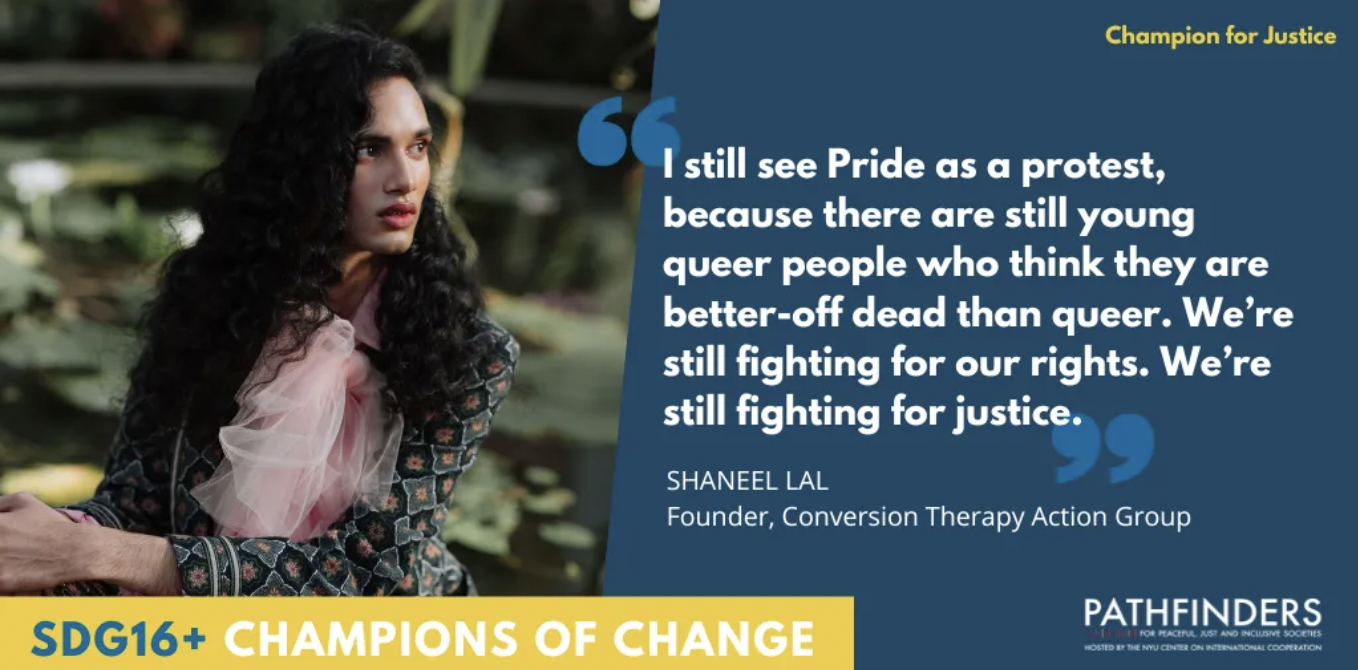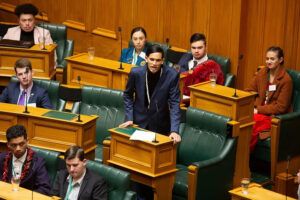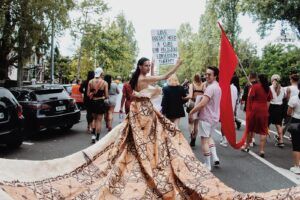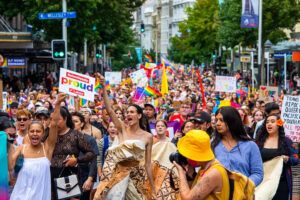The Queer Activist in New Zealand Fighting for Justice and Inclusion Everywhere
Contributors: Shaneel Lal
On the 19th of February 2022, New Zealand became only the fifth country to ban conversion therapy — the attempt by people in positions of authority to change a person’s sexual orientation or gender identity. Leading the campaign that resulted in the ban was Shaneel Lal, a 22-year-old queer activist who is also a member of the Pathfinders’ Young Justice Leaders.
Shaneel spoke to Mark Weston about how they convinced the New Zealand government to ban the practice and shared some of their many other efforts to prevent injustice. They changed a system that was not effectively addressing injustice, worked to make people understand the individual cases of injustice to gain support for their work, and partnered with others to provide a range of people-centered services to those who are excluded or harmed.
On the night before the interview, a building in Tauranga that housed a drop-in mental health center for queer young people was burned down in a queer-phobic attack. Shaneel had already started a crowdfunding campaign to pay for a rebuild, which had raised almost US$18,000 in its first 12 hours. As Shaneel observed, “This shows that we have support, but it seems we first have to be abused in order to get that support.”
Mark: What inspired you to become an activist in the first place?
Shaneel: I don’t think I ever made the choice to become an activist. I was born into a world that didn’t agree with my existence, so my very existence was a retaliation against the status quo and that was a form of activism. I basically came out of my mum with a Pride flag in my hand and yelling “freedom.”
We would much rather be born into a world that respects our humanity. I don’t think people want to be activists — why does the need or wish to be respected as a human being make you an activist?
Mark: You set up the Conversion Therapy Action Group. Can you explain what conversion therapy is and how you identified the need to do something about it?
Shaneel: Conversion therapy is any practice that aims to suppress, change, or eliminate someone’s queer identity to make them cisgender and heterosexual.
In the past, people used electro-convulsive therapy. For example, we have worked with a lesbian woman who is 70 years old who when she was young was given more than 200 electric shocks in the Princess Margaret hospital in New Zealand. She’s still a lesbian but she ended up hating herself.
More recently, people have turned to psychoanalysis, which involves sitting down with a counselor as they tell you that your brain can be rewired, or to aversion therapy, where you are told to snap yourself with a rubber band every time you have a queer thought. The goal is to associate your queerness with pain so accepting that you are queer becomes a punishment itself.
Mark: Who does this?
Shaneel: The biggest breeding ground for conversion therapy is among religious extremists, mostly Christian in the case of New Zealand — grown men who tell little children that if they don’t change, they will go to hell. There are stories of young children praying to God to heal them or kill them. I grew up in Fiji until I was 14 and I experienced it there too.
In 2017, I was volunteering at reception in the Middlemore hospital in New Zealand and a church leader walked up and said he could “pray my gay away,” which is the more common name for conversion therapy. When I refused he said, “It’s hot here but do you know where it’s hotter? Hell.”
That’s when I realized New Zealand hadn’t banned conversion therapy.

Shaneel Lal speaks in New Zealand’s Youth Parliament on conversion therapy (Photo: Provided)
Mark: And then you decided to act?
Shaneel: Yes, I got an opportunity to speak in parliament and I made a speech about conversion therapy, which went viral on the internet. That’s how I started the movement. I set up the action group and we agitated for four years before the government banned the practice.
Mark: How did you get to speak in parliament?
Shaneel: We have a youth parliament here, so every three to four years your MP chooses a young person to represent them in parliament.
Mark: You lucked out with your MP?
Shaneel: Well, my MP chose me based on my work elsewhere — she didn’t know I was going to speak about conversion therapy. She was out of the country when I spoke about it, so it was a surprise to her! But she was very supportive.
Mark: This is a good example of preventing injustice, which is one of the main pillars of the Justice for All report. Can you tell me about the Conversion Therapy Action Group’s activities? What were your main advocacy strategies?
Shaneel: When my speech went viral, people began to realize conversion therapy was happening in New Zealand. The group’s main work in the beginning was primarily about educating people, because many people refused to believe that this kind of injustice could take place in our country. This is an issue in all activist campaigns — people who are privileged and not affected by the issues refuse to believe that a marginalized group is facing a problem. So we collected the information on individual cases and shared the stories of survivors and victims of conversion therapy. This made people realize the horrors people were going through.
We also petitioned the government. The movement to ban conversion therapy currently holds the record for the biggest petition ever tabled at New Zealand’s parliament. It had 150,000 signatures, which is 3% of New Zealand’s population. This is a much higher number than any previous petition!
Mark: How did the government respond?
Shaneel: They produced a draft law, which I thought was rubbish because it said that if you are 18 or over and are subjected to conversion therapy, you have to have suffered serious harm for the person who did it to be held liable. Under New Zealand law, serious harm is defined as grievous bodily harm — it doesn’t include psychological harm. The main consequence of conversion therapy is that victims become severely depressed or suicidal, but if you’re over 18 and go through this you can’t hold the perpetrator to account because you haven’t suffered serious harm.
We advocated to have the bill changed. More than 100,000 people made written submissions to the Justice Select Committee to have it amended and 3,000 people made oral submissions. The Conversion Therapy Action Group facilitated this activism.
Mark: Did the submission have an impact?
Shaneel: Well, the bill was passed as presented because the government is a majority government, so they could pass whatever they wanted. But the submissions forced the government’s lawyers to write a report for us about why they were not acting on our submissions. We were able to get them on record as saying why they weren’t going to do as we proposed. So in the future, when the bill fails to work as it was designed to work, we will be able to hold them to account.

(Photo: Niu Creative)
Mark: Who did you enlist to help you?
Shaneel: Much of our campaign was on social media like Instagram and Twitter, but we also had a few progressive mainstream journalists who worked closely with us and came to us for comments, and we would go to them if we had anything new. They were influential in the sense that they reached those who were not following us on Instagram.
The downside of youth activism is that because we rely so much on Twitter and Instagram, we forget that so many adults over the age of 50 are not using those platforms, and those people are the ones who show up to vote. The people we needed to convince were the people who were in power and the people who were choosing who would be in power, and those are older people. So the media was able to print stuff on paper that those people would read. We also had multiple ten-minute long stories on TV of different people who had experienced conversion therapy.
Mark: What challenges did you face during the campaign?
Shaneel: Movements can stall. Sometimes you start something and people are very interested at the beginning, and you keep going on about it and nothing’s changing because the authorities aren’t responding to you, so people lose interest. We had that problem as well because the campaign ran for four years, so people lost interest at times.
Mark: How did you address that?
Shaneel: We identified our key moments and really pushed on social and mainstream media so we could keep bringing people back. We also ensured we had something for people to do — it’s one thing to create cool content that people can share on Instagram; it’s another to make them feel engaged and that they are part of the movement and making a change. So, on top of signing petitions, we engaged people in writing letters to their local MPs, which was more personal than writing to the Minister of Justice. By writing their own letters to their MPs and getting responses, people became more invested in the campaign.
Mark: What other causes do you plan to fight for?
Shaneel: In New Zealand, gay and bisexual men are essentially banned from being blood donors. They have to have abstained from sex for three months before they can give blood, but there is no way of testing whether someone is gay or bisexual, or whether they had sex in the last three months. So the test relies entirely on trust, and on the donor not lying about when they last had sex. It’s a stupid, impractical rule.
Of course you need to ensure the blood is safe but there are so many ways of ensuring that other than a blanket ban on gay and bisexual men donating blood. I’m trying to address this, and we have a study that will be released at the beginning of next year on this topic.
There is also the wider issue of working to decriminalize homosexuality throughout the Pacific, because many Pacific islands still criminalize homosexuality.
Mark: You are also a member of the Young Justice Leaders. What inspired you to join this group and how do you hope to use the platform to fight for justice?
Shaneel: I was born and grew up in Fiji, where homosexuality was criminalized, and then I moved to New Zealand and felt that I’d escaped this homophobic place. What I saw was that the Global North, or the international community — which is effectively the same thing — had overlooked the human rights crisis in the Pacific. So when I joined Young Justice Leaders, I joined with the passion to uplift the voices of those who have been ignored by the Global North.
Mark: Are there any benefits that you have already reaped from being part of the group?
Shaneel: I’ve connected with Iliana Pujols, another Young Justice Leader, on the subject of youth justice. We’re talking about whether young people aged 24 and under have the capacity to be held criminally liable. The reason why rich, white people are always in power is because they throw people from marginalized population groups into prison at a young age. Indigenous women from New Zealand are the most incarcerated population in the world. How are indigenous peoples meant to take back control or have leadership positions if we are thrown into jail at a very early age?

(Photo: Sam Sutherland)
Mark: You have also been involved in Rainbow Youth and the Auckland Pride Festival. What changes do you think have been achieved through this work?
Shaneel: Rainbow Youth provides mental health support services to young queer people. Young queer people in New Zealand are five times more likely to commit suicide than non-queer young people. This is why organizations like this are necessary.
We have face-to-face meetings with young people, and we also help parents to support their queer children. We started off working from a little room, but we now have offices all over the country. So there’s a strong demand for the services we offer.
The Tauranga Rainbow Youth office was the one that was burned down last night. We must be making some difference to piss people off enough to want to burn us down.
Mark: And what about the Auckland Pride Festival?
Shaneel: I still see Pride as a protest, because there are still young queer people who think they are better-off dead than queer. We’re still fighting for our rights, and when you hear, as we did last week, about a school charter that forces parents to agree that marriage can only be between a man and a woman, or when a Rainbow Youth building is burned down overnight, you realize queer people are not safe in New Zealand and that we need Pride as a sign of protest and retaliation.
Mark: Are you worried about the risks to your own safety?
Shaneel: I’ve been sent multiple death threats and I get horrible messages, but I think about all the people that came before me who didn’t have the luxury of doing this safely at all, whereas I have the luxury of sitting here talking to you about these issues. Obviously, I’m safer than the people who came before me, and hopefully those who come after me won’t have to do this at all.
Shaneel Shavneel Lal is iTaukei and Indian and identifies as vakasalewalewa and hijra. They are a member of the inaugural cohort of the Young Justice Leaders. Lal is the founder of the Conversion Therapy Action Group, a group that successfully advocated for the criminalization of conversion therapy in Aotearoa, New Zealand. Lal is an executive board member of Rainbow Youth and Auckland Pride Festival and a trustee of Adhikaar Aotearoa, a non-profit charity that provides education, support and advocacy for queer South Asians. Lal has served as an advisor to the New Zealand Minister of Education for three years and has sat on Amnesty International’s Youth Task Force. Lal has been a Global Youth Leader for Open Government Partnership. Lal is a model, political commentator on queer and indigenous rights issues, and a law and psychology student at the University of Auckland. Lal is a writer focusing on indigenous queerness.
Mark Weston is an independent writer, researcher and policy consultant, working on access to justice, intergenerational equity, youth employability, public health and other issues for global clients including the Pathfinders. His most recent book is The Saviour Fish.
Related Resources
